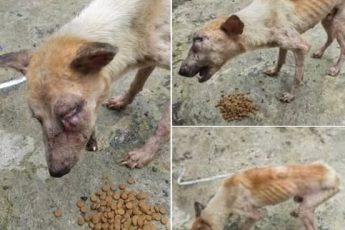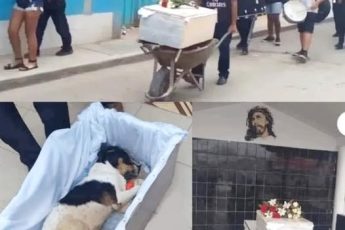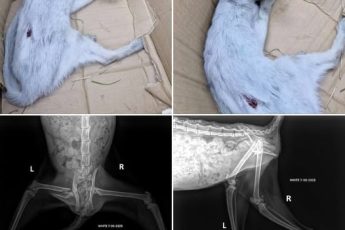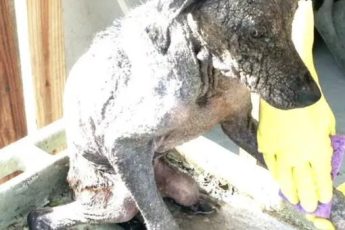He stood by the trash bins.
Small, wet, blind.
He didn’t cry.
He didn’t whimper.
He didn’t beg.
He just stood there.
Because there was nowhere else to go.
That’s the ending written for him by the people who once called themselves his “owners.”
People he likely once trusted. Whose scent he knew. Whose breath he felt near him at night.
People who, one day, without a trace of shame, carried him to the dumpster — like an old object.
Like a useless bag, no longer of value.
Next to him lay a scrap of paper.
On it, in shaky handwriting, were the words:
“He went blind. We can’t take care of him anymore. Sorry.”
But sorry isn’t the right word.
You can apologize for a mistake.
But how do you ask forgiveness for betrayal?
How do you forgive someone who gives up on a living creature — completely dependent on them — not because they can’t care for it, but because they don’t want to try?
He trembled.
Not from the cold — but from fear.
Because the smells were unfamiliar, the footsteps threatening, the voices strange.
And he couldn’t see any of it.
In a world full of sounds and scents, he had been abandoned to die alone.
No water bowl.
No scrap of food.
Not even the slightest chance to survive.
People noticed him.
Some laughed.
Some pitied — but kept walking.
After all, he wasn’t barking, wasn’t biting, wasn’t causing trouble — just standing there.
And every person who passed became part of his pain.
Because indifference is no less a crime than betrayal.
Only one woman stopped.
Not out of pity — but because her heart couldn’t take it.
She approached.
He didn’t back away.
He couldn’t see her face.
But he felt: this wasn’t danger.
This was a chance.
Maybe the last one.
She picked him up — wet, smelling of garbage, shaking from despair.
And for the first time in a long while, he didn’t resist.
Because he felt: enough. No more pain.
And if this was the end — let it be in someone’s arms, not next to a dumpster.
She didn’t know his name.
She didn’t know his age, or what exactly had happened.
Only one thing was clear — he was blind.
His eyes, clouded over, held no fear or hope.
Only darkness — the kind he had been living in not just physically, but deep inside.
At the clinic, they found out: despite the blindness, the dog was relatively healthy.
His heart was strong.
Lungs were clear.
He could live — not just survive, but live — if someone hadn’t thrown him away like trash.
And if one person hadn’t cared enough to stop.
Now, his name is Lucky.
Ironic, isn’t it?
To call “Lucky” the one who was betrayed, who was meant to die by a dumpster.
But now, the name makes sense.
Because Lucky has a home.
A small bed in the corner.
A bowl of soft food.
A gentle voice that says when he walks, “I’m here, don’t be afraid.”
He’s learning to trust again.
To navigate by sound.
To understand that footsteps don’t mean danger — they mean care.
He doesn’t see.
But he feels.
A hand on his head.
A pillow — soft and warm.
A voice that tells him every day:
“You matter.
You’re important.
You are loved.”
Lucky’s story isn’t just about a dog.
It’s about us.
About how easy it is to turn away.
And how important it is — to stop.
Just once.
One moment.
To stop — and become someone’s light.
Even if they can’t see it.
They threw him out like garbage. He was blind. They left a note that said…
He stood by the trash bins.
Small, wet, blind.
He didn’t cry.
He didn’t whimper.
He didn’t beg.
He just stood there.
Because there was nowhere else to go.
That’s the ending written for him by the people who once called themselves his “owners.”
People he likely once trusted. Whose scent he knew. Whose breath he felt near him at night.
People who, one day, without a trace of shame, carried him to the dumpster — like an old object.
Like a useless bag, no longer of value.
Next to him lay a scrap of paper.
On it, in shaky handwriting, were the words:
“He went blind. We can’t take care of him anymore.





